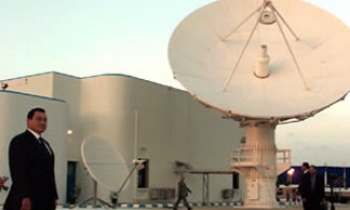(CNSNews.com) - Media rights campaigners have criticized Israel for firing missiles at a Beirut-based television station, but Israel and other critics say the broadcaster serves a function far more dangerous than disseminating news.
Israeli missiles on Thursday targeted a transmission antenna of the al-Manar television network in the Lebanese capital. The station, which is run by the Shi'ite terrorist organization Hizballah, said in a statement that three employees were lightly hurt and two floors of the facility badly damaged.
Israel also struck two al-Manar transmitters elsewhere in the country.
The strike was part of Israel's military response to Wednesday's cross-border raid by Hizballah, during which eight Israeli soldiers were killed and two more kidnapped.
News of the abduction was first broken by al-Manar, which said the soldiers' capture was in line with Hizballah's "pledge to liberate the prisoners." Hizballah wants to exchange the two Israelis for Arab prisoners in Israeli jails.
After the missile attack, al-Manar urged national and international bodies to "adopt a clear stance regarding the Israeli brutal aggression and to protect the freedom of journalism."
Later Thursday, the New York-based Committee to Protect Journalists called on Israel to explain the attack on the TV station.
"The Geneva Conventions prohibit attacks on civilian targets unless they are used for military purposes," it said.
"While al-Manar may serve a propaganda function for Hizballah, it does not appear, based on a monitoring of its broadcasts today, to be serving any discernible military function."
Another media freedom group, the Paris-based Reporters Without Borders, also included a reference to the al-Manar attack in a statement expressing concern for the safety of Lebanese journalists.
Amnesty International, in a statement calling on Israel, Lebanon and Hizballah to end attacks against civilians and civilian targets, appeared to draw a distinction between "civilian objects" like Beirut airport and bridges, and "Hizballah targets" like al-Manar.
Israel's foreign ministry does not consider the broadcaster to be a conventional media outlet.
"The al-Manar station has for many years served as the main tool for propaganda and incitement by Hizballah, and has also helped the organization recruit people into its ranks," it said in a statement.
Hizballah, the ministry added, constitution "a severe terror threat" to Israeli civilians and soldiers.
Washington Institute for Near East Policy director of terrorism studies Matthew Levitt told a House International Relations Committee hearing last year that al-Manar (the name means The Beacon) was "used by Hizballah and Iran to radicalize Muslim youth and glorify violence, especially in the contexts of Israel and Iraq."
"Al-Manar glorifies suicide bombings, calls for attacks targeting Israel, coalition forces in Iraq, and the United States, and seeks to create a radicalized constituency that is as likely to seek out terrorist groups themselves to join their ranks as they are to be sought after and recruited by these groups."
Levitt cited a video broadcast by the network showing Koranic verses scrolling across the screen against background footage of the aftermath of suicide bombings, burning Israeli and American flags, and similar images.
Another al-Manar video, focusing on Iraq, stated: "Down with the mother of terrorism! America threatens in vain, an occupying army of invaders. Nothing remains but rifles and suicide bombers."
"The video ends with an image of a suicide bomber's belt detonating," Levitt told the lawmakers.
In late 2004, the French government came under fire after it authorized the use of a French satellite network for al-Manar to beam its programs into millions of Muslims' homes across Europe.
Accusing the station of spreading a message of hatred and anti-Semitism, a French Jewish group organized a petition which was signed by tens of thousands of people, including the leaders of France's four largest political parties.
Organizations in the U.S. and Israel also protested the decision.
It emerged that just four days after the French broadcasting authority had given the go-ahead - based on an Al-Manar undertaking not to air programs that might incite hatred based on race, religion or nationality - the station had broadcast a report in which Jews were accused of deliberately spreading AIDS in Arab countries.
Weeks later, the government relented, saying its license would be revoked because it spread hatred and violence.
Al-Manar said the ban was the result of pressure by "the Zionist lobby" and was an attack on freedom of expression.
On its website Thursday, Hizballah said Israel had fired missiles at the station "for fear of the free voice it represents."









